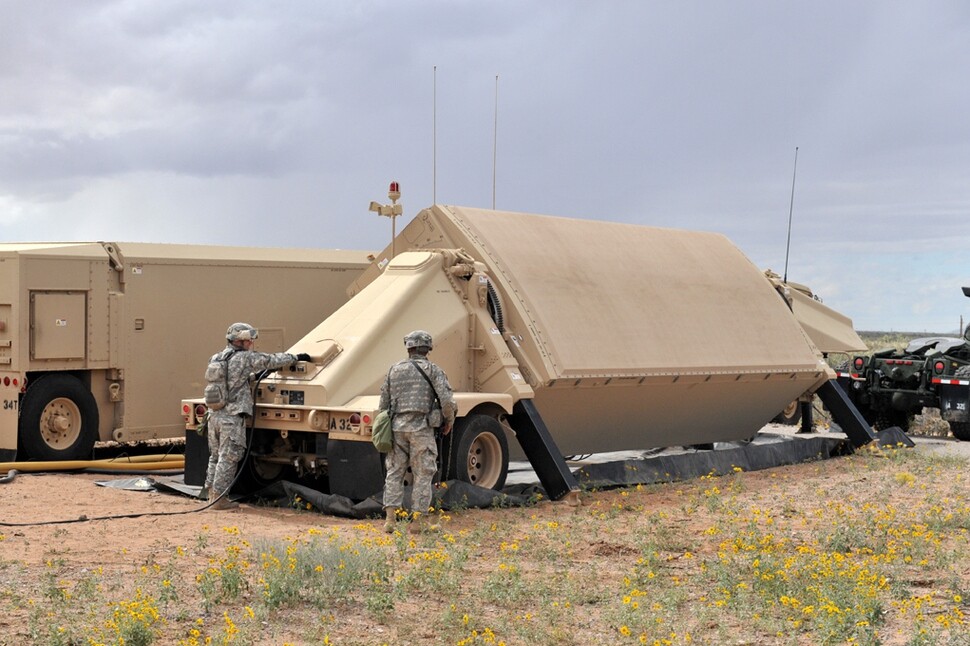hankyoreh
Links to other country sites 다른 나라 사이트 링크
US rejects China’s call to act as a mediator on North Korean nuclear issue

For now, the US has rejected a proposal made by the Chinese government on Mar. 8 for the simultaneous suspension of North Korea’s nuclear weapon and missile development program and of the US and South Korea’s joint military exercises. This reconfirms American plans to push ahead with the deployment of the THAAD antimissile system on the Korean Peninsula.
“It’s not a fair trade,” said Mark Toner, acting spokesperson for the US State Department, on Mar. 8, when asked about China’s proposal to act as a mediator toward resolving the North Korean nuclear issue.
“This is apples and oranges,” Toner said. “Our joint military exercises are transparent, they’re defense-oriented, and have been carried out regularly and openly under the Combined Forces Command for going on 40 years.” He added that this “is in no way comparable to the blatant disregard that North Korea has shown with respect to international law.”
“We remain open to dialogue with North Korea with the aim of returning to credible and authentic negotiations on the denuclearization of the Korean Peninsula,” Toner said, while noting that “the onus is on North Korea to take meaningful actions toward denuclearization and refrain from provocations.”
“The US is unlikely to immediately accept a simultaneous suspension of North Korea’s nuclear and missile development and the US-ROK joint exercises. [China’s] proposal was the first step,” said a diplomatic source who is knowledgable about circumstances in China, hinting that China will take additional action in the future.
During the regular press briefing on Mar. 8, White House Press Secretary Sean Spicer said, “We’re continuing to work with the government of South Korea to make sure that they have the defenses necessary to protect themselves. The deployment of a THAAD system is critical to their protection.”
While the US has repeatedly stated that the objective of the THAAD deployment is to protect both the people of South Korea and the US military, Spicer only mentioned protecting South Korea during the day’s briefing.
In a press conference held after an emergency meeting of the UN Security at the UN headquarters in New York on Mar. 8 in regard to North Korea’s missile launch, US Ambassador to the UN Nikki Haley said, "We are not dealing with a rational person,” referring to North Korean leader Kim Jong-un.
“National Security Council deputies have considered a range of options, and have already come to the predictable conclusion that a dramatic show of force, like attacks on the North’s missile and nuclear sites, would probably start a war,” the New York Times reported on Mar. 7 in a story about the North Korean policy being considered by the Trump administration, suggesting that the much-discussed idea of a preemptive strike has effectively been ruled out.
By Yi Yong-in, Washington correspondent
Please direct questions or comments to [english@hani.co.kr]

Editorial・opinion
![[Column] Has Korea, too, crossed the Rubicon on China? [Column] Has Korea, too, crossed the Rubicon on China?](https://flexible.img.hani.co.kr/flexible/normal/500/300/imgdb/original/2024/0419/9317135153409185.jpg) [Column] Has Korea, too, crossed the Rubicon on China?
[Column] Has Korea, too, crossed the Rubicon on China?![[Correspondent’s column] In Japan’s alliance with US, echoes of its past alliances with UK [Correspondent’s column] In Japan’s alliance with US, echoes of its past alliances with UK](https://flexible.img.hani.co.kr/flexible/normal/500/300/imgdb/original/2024/0419/2317135166563519.jpg) [Correspondent’s column] In Japan’s alliance with US, echoes of its past alliances with UK
[Correspondent’s column] In Japan’s alliance with US, echoes of its past alliances with UK- [Editorial] Does Yoon think the Korean public is wrong?
- [Editorial] As it bolsters its alliance with US, Japan must be accountable for past
- [Guest essay] Amending the Constitution is Yoon’s key to leaving office in public’s good graces
- [Editorial] 10 years on, lessons of Sewol tragedy must never be forgotten
- [Column] A death blow to Korea’s prosecutor politics
- [Correspondent’s column] The US and the end of Japanese pacifism
- [Guest essay] How Korea turned its trainee doctors into monsters
- [Guest essay] As someone who helped forge Seoul-Moscow ties, their status today troubles me
Most viewed articles
- 1[Column] The clock is ticking for Korea’s first lady
- 2After 2 months of delayed, denied medical care, Koreans worry worst may be yet to come
- 3Hong Se-hwa, voice for tolerance whose memoir of exile touched a chord, dies at 76
- 4[Column] Has Korea, too, crossed the Rubicon on China?
- 5US overtakes China as Korea’s top export market, prompting trade sanction jitters
- 6Samsung barricades office as unionized workers strike for better conditions
- 7[Editorial] As it bolsters its alliance with US, Japan must be accountable for past
- 8[Correspondent’s column] In Japan’s alliance with US, echoes of its past alliances with UK
- 9All eyes on Xiaomi after it pulls off EV that Apple couldn’t
- 10[Correspondent’s column] The US and the end of Japanese pacifism